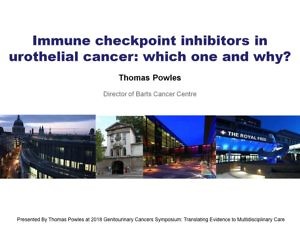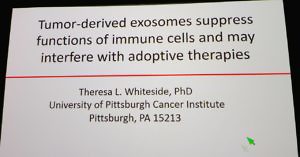Bench to bedside and back again

Can we break through the barriers of a hostile tumour microenvironment?
Who would have thought that after 30 years of no new therapies that urothelial carcinomas would suddenly be almost constantly in the spotlight with enticing words like cancer immunotherapy, biomarkers, tumour microenvironment, translational immunology etc?
And yet it has happened – with a lot more to come in this highly competitive niche too.
Prior to AACR in Chicago, we highlighted TGFβ in our Preview series as an important emerging target that is gathering attention and may be relevant in tumour types, such as urothelial carcinoma and ovarian cancer.
After the meeting, Dr Paul Rennert (CSO, Aleta Biotherapeutics) noted:
2 Key messages out of #AACR18 –
Innate immune agents could save the IO combo game
You best be thinking about TGFbeta https://t.co/388ffcfoS7
— Paul D. Rennert (@PDRennert) April 18, 2018
I don’t disagree with either of these sentiments – there was a reason we interviewed a lot of NK cell enthusiasts recently and we have since been rolling out our thought leader mini-series focused on TGFβ. Yesterday, we kicked off with perspectives from an academic researcher active in this field and tomorrow will showcase some practical clinical perspectives.
On deck today, we have a interview with a research scientist who has conducted both basic and translational work for a discussion about how he sees the learnings that have arisen from bench to bedside and back again.
To learn more and get a heads up on our latest thought leader interview and oncology insights, subscribers can log-in or you can click to gain access to BSB Premium Content.
This content is restricted to subscribers
 We have covered several clinical developments from Innate Pharma on lirilimumab, but they are actually more than a one compound biotech and have a growing pipeline of antibodies against several novel targets, some of which are unique to the company.
We have covered several clinical developments from Innate Pharma on lirilimumab, but they are actually more than a one compound biotech and have a growing pipeline of antibodies against several novel targets, some of which are unique to the company.
 At the 2018 ASCO Genitourinary Cancer Symposium, one of the standout keynote lectures was from Professor Tom Powles, Director of the Bart’s Cancer Cancer Center in London who talked about
At the 2018 ASCO Genitourinary Cancer Symposium, one of the standout keynote lectures was from Professor Tom Powles, Director of the Bart’s Cancer Cancer Center in London who talked about 
 At the recent 2017 American Association for Cancer Research (AACR) annual meeting, Dr Whiteside gave two fascinating talks in education symposia. Afterwards, she kindly spoke to BSB about her research.
At the recent 2017 American Association for Cancer Research (AACR) annual meeting, Dr Whiteside gave two fascinating talks in education symposia. Afterwards, she kindly spoke to BSB about her research.
 There has been much noise about biomarkers, including whether they work or not in this niche, as well as how do we go about selecting patients for therapies and combinations?
There has been much noise about biomarkers, including whether they work or not in this niche, as well as how do we go about selecting patients for therapies and combinations? Happy New Year!
Happy New Year! This post started out as a look a one of the Gems from the Poster Halls at ESMO, including an interview with a thought leader in biomarkers, then morphed into a broader Op Ed that includes a strategic analysis of where we are, where we are going, and how we could get there more effectively and efficiently.
This post started out as a look a one of the Gems from the Poster Halls at ESMO, including an interview with a thought leader in biomarkers, then morphed into a broader Op Ed that includes a strategic analysis of where we are, where we are going, and how we could get there more effectively and efficiently.